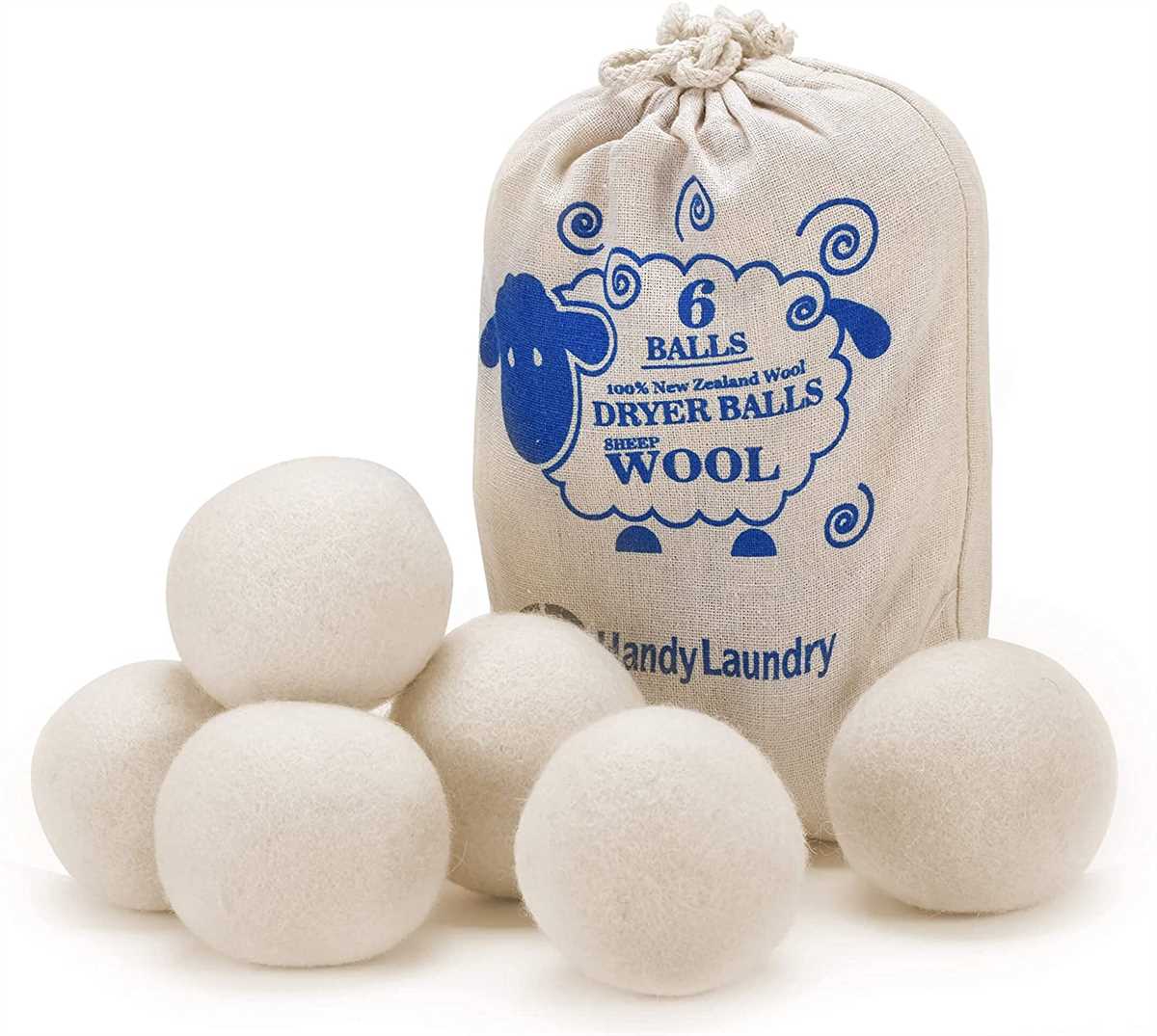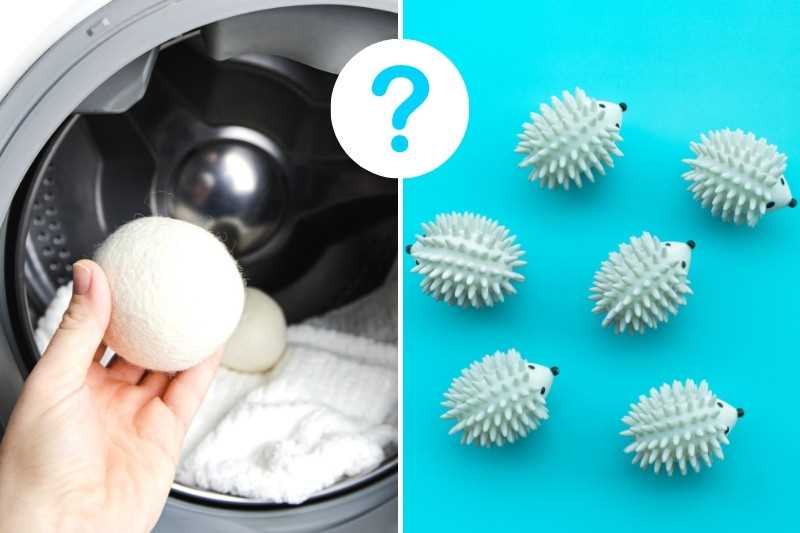


When it comes to drying your laundry, there are many options available on the market today. Two popular choices are wool dryer balls and plastic dryer balls. Both of these options claim to reduce drying time, soften fabrics, and eliminate static cling. But which one is truly better for your laundry?
Wool dryer balls are made from 100% natural wool and do not contain any synthetic materials or chemicals. They are eco-friendly and biodegradable, making them a great choice for those looking to reduce their environmental impact. These dryer balls work by bouncing around in the dryer, separating the clothes and allowing air to circulate more efficiently. This helps to reduce drying time and can also help to soften fabrics, making them feel softer and more comfortable against the skin.
On the other hand, plastic dryer balls are made from synthetic materials such as PVC or vinyl. While they are also designed to reduce drying time and eliminate static cling, they may not be as effective as wool dryer balls. Plastic dryer balls do not have the same ability to absorb moisture or create air pockets, which can limit their effectiveness. Additionally, some plastic dryer balls may contain chemicals that could be harmful to the environment or cause skin irritations.
In conclusion, wool dryer balls are a more natural and eco-friendly option compared to plastic dryer balls. They are effective at reducing drying time and softening fabrics, while also being safe for the environment and your skin. So, if you’re looking to improve your laundry routine, consider making the switch to wool dryer balls for a more sustainable and efficient drying experience.
Environmental Impact
When considering the environmental impact of wool dryer balls and plastic dryer balls, it is important to evaluate their production, usage, and disposal processes.
Production
The production of wool dryer balls is generally considered to be more environmentally friendly compared to plastic dryer balls. Wool is a natural and renewable resource, as it comes from sheep, which can be sustainably raised. The process of turning wool into dryer balls typically involves minimal chemical treatment and does not produce harmful byproducts. On the other hand, plastic dryer balls are usually made from synthetic materials derived from non-renewable resources, such as petroleum. The production of plastic dryer balls often involves energy-intensive processes and can contribute to greenhouse gas emissions.
Usage
Both wool dryer balls and plastic dryer balls offer benefits when it comes to usage. They help to reduce drying time, soften fabrics, and minimize wrinkles. However, wool dryer balls have the added advantage of being completely natural and chemical-free. This makes them a safer option for individuals with sensitive skin or allergies. Plastic dryer balls, on the other hand, may contain chemicals that can potentially leach into the laundry during the drying process.
Disposal
In terms of disposal, wool dryer balls are biodegradable and can be composted at the end of their life cycle. This ensures that they do not contribute to landfill waste. Plastic dryer balls, on the other hand, are not biodegradable and often end up in landfills, where they can take hundreds of years to decompose. Additionally, the production and disposal of plastic dryer balls contribute to the growing issue of plastic pollution.
In conclusion, wool dryer balls have a lower environmental impact compared to plastic dryer balls. They are made from a renewable resource, have minimal chemical treatment during production, and can be composted at the end of their life cycle. Additionally, wool dryer balls are safer for individuals with allergies or sensitive skin. By choosing wool dryer balls over plastic dryer balls, you can make a small but positive impact on the environment.
Effectiveness in Reducing Drying Time
One of the key benefits of using wool dryer balls is their effectiveness in reducing drying time. Unlike plastic dryer balls, which are lightweight and tend to bounce around in the dryer, wool dryer balls are heavier and more dense. This density allows them to absorb moisture from the clothes during the drying process.
As the wool dryer balls circulate in the dryer, they create separation between the clothes, allowing hot air to flow more easily. This increased airflow helps to speed up the drying time and reduces the need for prolonged drying cycles. Additionally, the wool dryer balls help to prevent clothes from clumping together, further enhancing the efficiency of the drying process.
Studies have shown that using wool dryer balls can reduce drying time by up to 25%. This not only saves energy but also reduces wear and tear on clothes, thus extending their lifespan. It’s important to note that the effectiveness of wool dryer balls in reducing drying time can vary depending on the load size and the type of fabric being dried.
On the other hand, plastic dryer balls are less effective in reducing drying time. Due to their lightweight nature, they may not create enough separation between the clothes to allow for proper airflow. This can result in longer drying cycles and potentially higher energy consumption.
| Criteria | Wool Dryer Balls | Plastic Dryer Balls |
|---|---|---|
| Absorption of moisture | High | Low |
| Circulation and airflow | Optimal | Limited |
| Reduction in drying time | Up to 25% | Less significant |
In conclusion, wool dryer balls are more effective than plastic dryer balls in reducing drying time. Their ability to absorb moisture, create separation between clothes, and enhance airflow results in faster and more efficient drying cycles. By choosing wool dryer balls over plastic dryer balls, you can save energy, reduce utility costs, and prolong the lifespan of your clothes.
Softness and Anti-Static Properties

When it comes to softness and anti-static properties, wool dryer balls definitely have the advantage over plastic alternatives.
1. Softness: Wool dryer balls are made from 100% natural wool fibers, which are much softer than the plastic used to make traditional dryer balls. As a result, wool dryer balls can help to soften your clothes, making them feel fluffier and more comfortable against your skin.
2. Anti-Static: Static electricity can be a common problem when drying clothes, especially during the winter months. Wool dryer balls can help to combat static cling by absorbing moisture from your clothes, preventing the build-up of static electricity. This means that your clothes will come out of the dryer static-free and easier to handle.
Plastic dryer balls, on the other hand, do not have the same softness or anti-static properties as wool dryer balls. They may help to reduce drying time and minimize wrinkles, but they do not provide the same level of softness or anti-static benefits.
In summary, if you are looking for soft, static-free clothes, wool dryer balls are the better option. They provide a natural and environmentally-friendly solution that can improve the quality of your laundry without the use of harsh chemicals or synthetic materials.
Cost and Durability
When it comes to cost, wool dryer balls tend to be more expensive upfront compared to plastic dryer balls. A set of wool dryer balls typically costs around $15 to $20, while a set of plastic dryer balls can be purchased for less than $10.
However, when considering the longevity of the product, wool dryer balls are more durable and can last for several years. On the other hand, plastic dryer balls may need to be replaced more frequently as they can crack or break over time.
Additionally, wool dryer balls can help reduce drying times, which can lead to energy savings and lower utility bills. This feature can contribute to their overall cost-effectiveness in the long run.
While plastic dryer balls may be more affordable initially, the need for replacement and potential energy inefficiency could make them less cost-effective over time.
Overall, wool dryer balls offer a better durability and potentially greater cost-effectiveness compared to plastic dryer balls.
Allergies and Sensitivities

Allergies and sensitivities to laundry detergents, fabric softeners, and dryer sheets are common concerns for many people. These products often contain harsh chemicals and fragrances that can irritate the skin and respiratory system, leading to symptoms such as rashes, itching, sneezing, and coughing.
Wool dryer balls are a natural alternative that can be beneficial for those with allergies and sensitivities. Unlike plastic dryer balls, which may contain chemicals and artificial fragrances, wool dryer balls are made from all-natural materials.
The use of wool dryer balls can help minimize the risk of allergic reactions and skin irritations caused by laundry products. Wool is hypoallergenic, meaning it is unlikely to cause an allergic reaction. Additionally, wool has natural anti-microbial properties, which can help prevent the growth of bacteria and fungi that can irritate sensitive skin.
Furthermore, wool dryer balls do not release any artificial fragrances, which can be a trigger for allergies and sensitivities in some individuals. This makes them a safer alternative for those who are sensitive to strong scents or have asthma or respiratory conditions.
It is important to note that some people may still be sensitive to wool itself. If you have a known allergy or sensitivity to wool, it is best to avoid using wool dryer balls and opt for alternative methods of drying your laundry.
Overall, wool dryer balls are a preferable option for those with allergies and sensitivities compared to plastic dryer balls and synthetic laundry products. They provide a natural and chemical-free way to soften fabrics and reduce drying time without compromising air quality or skin health.
FAQ
Are wool dryer balls better than plastic ones?
Yes, wool dryer balls are generally considered better than plastic ones. They are eco-friendly, chemical-free, and help reduce drying time by absorbing moisture and creating space between clothes for better air circulation. They also help reduce static cling and wrinkles, and can be reused for multiple loads.
Do wool dryer balls have any benefits over plastic dryer balls?
Yes, wool dryer balls have several benefits over plastic dryer balls. They are natural, hypoallergenic, and chemical-free, making them ideal for people with sensitive skin or allergies. They also help reduce drying time, static cling, and wrinkles, and can be used for a long time without losing effectiveness.
What are the advantages of using wool dryer balls?
There are several advantages of using wool dryer balls. Firstly, they are eco-friendly and biodegradable, unlike plastic dryer balls which can add to landfill waste. Secondly, wool dryer balls help reduce drying time by absorbing moisture and creating space between clothes for better air circulation. They also help reduce static cling and wrinkles, and can be reused for multiple loads.
Are there any disadvantages of using plastic dryer balls?
Yes, there are a few disadvantages of using plastic dryer balls. Firstly, they are not environmentally friendly as they are not biodegradable and can contribute to landfill waste. Secondly, some plastic dryer balls may contain chemicals that can transfer to your clothes during drying. Lastly, plastic dryer balls may not be as effective in reducing drying time, static cling, and wrinkles compared to wool dryer balls.
Can I use wool dryer balls if I have sensitive skin or allergies?
Yes, wool dryer balls are suitable for people with sensitive skin or allergies. They are hypoallergenic and chemical-free, unlike some plastic dryer balls that may contain irritants or chemicals. Wool dryer balls are a natural alternative that can help reduce skin irritation and allergic reactions. However, it is always recommended to test a small area of clothing or fabric before using them extensively.
What are wool dryer balls?
Wool dryer balls are natural alternatives to dryer sheets that are used to reduce drying time and make clothes softer. They are made from 100% wool and are chemical-free.
How do wool dryer balls work?
Wool dryer balls work by absorbing moisture from the clothes in the dryer, which helps to reduce drying time. The balls also help to separate the clothes, allowing for better airflow. This helps to prevent static cling and makes the clothes softer.












